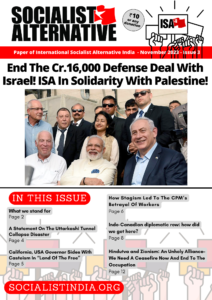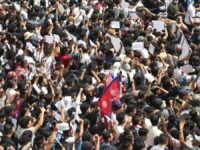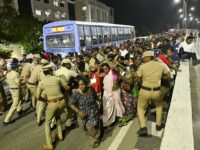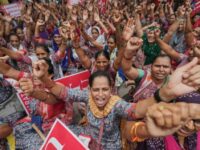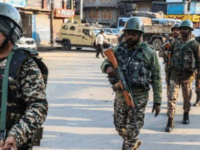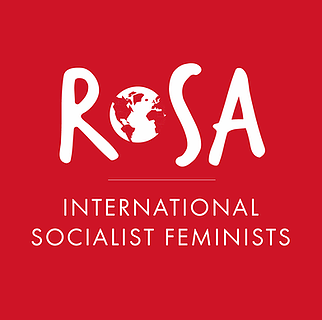Pakistan. Imran Khan Ousted — Political Crisis and the Socialist Alternative

Pakistani society is in for a turbulent period. While the poor and working people of the country have desperately searched to find a way out of the sky-high inflation and cost of living crisis, none has seemingly been on offer.
Pakistan’s ruling elite has been troubled, including in the pre-Covid era, with an economic collapse. Pakistan’s foreign currency reserves are now almost totally non-existent. Inflation is sitting at well above 13 per cent. According to the Financial Times, fuel, food and soap have continually risen in price — by 18 per cent year on year.
At the same time, the coming to power of the Taliban in Afghanistan following US withdrawal has posed a new economic headache with an influx of Afghan refugees, desperately seeking safety and refuge from the horrors of violent fundamentalist rule. Now, the still-ongoing bloodbath in Ukraine and its impact on food inflation has further compounded a devastating situation for the poor and working class.
Cracks within political elite
In past weeks, growing divisions at the top of Pakistani society, including within the top military elite, have become increasingly exposed.
Pakistan’s now-former Prime Minister, Imran Khan and his Pakistan Tehreek-e-Insaf party (Pakistan Movement for Justice — PTI), have now been successfully deposed by a parliamentary coup d’etat. The forces that helped to unseat him by a 2-seat majority were disparate and united solely on an anti-Khan basis. In a rare feat, the parties of the two warring families of Pakistan — the Pakistan Muslim League (PML-N) representing the Sharif family and the Pakistan People’s Party (PPP), controlled by the Bhutto family — found common cause, as part of an alliance including amongst others, representatives of the right-wing, reactionary fundamentalist party Jamiat Ulema-e-Islam (JUI).
Unsurprisingly, Khan was not in a mood to accept this result. First, he attempted to dissolve parliament and call fresh emergency elections to avoid the vote of no confidence. When the Supreme Court ruled against him, Khan orchestrated a walkout, resulting in a temporary situation of two groups claiming the mantle of the National Assembly.
Needless to say, it didn’t work. The military generals who make power in Pakistan had already made their minds up. The army always decides who takes power. However, the evidence available suggests that Khan, attempting to bolster his own power within the army, proved to be unacceptable to the military top brass.
While Khan has in theory accepted his deposition and the coming to power of the PML-N’s Shehbaz Sharif, this by no means spells the end of Khan as a figurehead, who has doubled down on his populist rhetoric of a ‘US-backed coup’. Nor has Khan’s appeal to a certain section of society totally gone away, as was revealed in the recent local elections in Khyber Pakhtunkhwa, where the PTI came out clearly in the lead.
This represents a drastic and rapid reversal in the fortunes of the PTI. One poll conducted in September 2021 found that seven out of 10 Pakistanis believed he would be the first Prime Minister to achieve a full-length term — a feat that has not been achieved by a single Prime Minister since the creation of the country through partition in 1947.
Behind this, it is well known that Pakistani politics and Pakistan’s capitalist ‘democracy’ is a sham — a stage play with the appearance of ‘democratic process’. Corrupt politicians, awash with dirty money and backed up by semi-military rule, routinely accuse one another of corruption, while grandstanding with demagoguery claiming to be on the side of ‘the people’. This is why, after almost two decades of so-called ‘civilian rule’, it is well known that those in power are not those democratically elected but whoever has the blessing of the military elite. As the old saying goes, ‘It’s not the people who vote that count, it’s the people who count the votes.’
PML-N in power
Sharif and the PML-N’s coming to power was met with a sigh of relief by certain sections of Pakistan’s ruling class and political elite. The PPP’s Bhutto Zardari said in celebration, “welcome back to the old Pakistan”. But this only underlines the total disconnect between Pakistan’s ruling class and the ordinary people of the country.
The restoration of the Sharif-Bhutto dynasties in power marks the continuation of a history of rotten power and corruption. The Sharifs have a long history of acting as accomplices to military dictatorship. Nawaz Sharif, the former Prime Minister tried and convicted of corruption in 2018 under Khan, himself acted as a finance minister under the bloodthirsty military regime of Muhammad Zia-ul-Haq. Shehbaz Sharif, clearly following the tradition of his own dynasty, has now appointed his own multi-millionaire son, Hamza Shehbaz Sharif as Chief Minister of Punjab — a position that the senior Sharif had been appointed to by his own father!
It is clear then that the government of Sharif, already widely despised as a ‘return to normal’ will completely and totally fail to place a stabiliser on Pakistani capitalism. His promise to “bring stability to Pakistan” will quickly be revealed as a fraud insofar as it hasn’t already.
Government of ‘change’?
It is in this context that Khan managed to achieve and even maintain some support among a section of Pakistani society — particularly among urban professionals and middle class youth facing the economic pressure of the crisis. Having been elected on the basis of the vague slogan of “change”, Khan made the most of his status as an outsider to the big two political families. With his campaign promise of creating his so-called ‘Islamic welfare state’, he had cultivated a record of criticism of the rotten role played by US imperialism and the IMF in the region, epitomised in his statement that he would be prepared to kill himself before going to the IMF. But socialists have to be clear. At no point did Khan’s approach represent any kind of left programme. While his rhetoric never went beyond vague populism, he managed to fuse it with a heavy streak of reactionary Islamism for instance in more open praise of the Taliban in Afghanistan.
Of course this sort of demagoguery is nothing new to Pakistan. It is exactly why the military adopts its method of short-term rule: lean on figures who can whip up popular support with whatever reactionary mixture and seize on the massive discontent existing among the working class in society, then throw them out when they prove either unwilling or incapable to reform away corruption and poverty. Nawaz Sharif, a rotten representative of imperialism and capitalism, was himself elected on the basis of calling for a “revolution”.
To the shock of many who had invested support in him, Khan proved to be anything but the change he has claimed to represent. But the very clear warning signs were there. Yes, he was not part of the two families dominating politics in Pakistan for the past half a century. But since his career as a celebrity cricketer, Khan’s mansion residence in the home of Islamabad’s bourgeoisie, his extravagant wealth and high-flying lifestyle meant that he has spent decades rubbing up with the circles of the wealthy and powerful. Never at any point was Khan prepared to truly mount a serious challenge to the rule of the capitalist class and military establishment. As a result, the PTI government based itself on maintaining Pakistan’s links to the predatory institutions of US and Chinese capitalism.
Khan continued to maintain the pivot towards Chinese capital that had been implemented partially by the previous Sharif government, opening up Pakistan’s economy and natural resources to the exploitation of the China-Pakistan Economic Corridor (CPEC) — a flagship policy of Xi Jinping’s Belt and Road Initiative.
While he maintained much of his anti-IMF and anti-US rhetoric, in practice his government utterly failed to tackle the power and hold the IMF holds over Pakistan’s economy. State reliance on IMF loans actually increased under the PTI, with a $6bn loan package — the twelfth loan since the 1980s.
As always, however, such ‘bailouts’ from the imperialist powers never come without strings attached. In January 2022, Khan pushed through the Assembly a bill legislating increased “independence” (i.e. marketisation) of the State Bank of Pakistan. But it has actually been these neoliberal economic policies that have deepened Pakistan’s economic catastrophe. Since 2018, the cost of essentials rose by around 50 per cent. The rupee dropped by 30 per cent. Cuts and privatisation of housing, education and healthcare escalated.
When health sector workers responded to this onslaught with protests and strike action in early 2020, to demand the full funding, PPE and an end to privatisation and cuts required to fight the spread of the pandemic, police were sent in to baton-charge the workers.
Regardless of whatever Khan’s genuine intentions were in carving out his reputation as a fighter against the ‘elite’, what the experience of the government shows is that the deep economic, social and political crisis in Pakistan has nothing to do simply with ‘individuals in power’. It is a product of an entire system, an entire ruling capitalist class as part of the disastrous legacy of imperialism and colonialism. Without a clear programme to sweep away the rule of the millionaires and billionaires, foreign and domestic, that dominate Pakisani society, zero fundamental change will come about.
In the crossroads of the New Cold War
Through its history under so-called ‘independence’, the Pakistan ruling class has maintained a series of uneasy alliances and rivalries. Traditionally, the Afghan Taliban government was supported by the Pakistani military, as a pawn in its conflict with India. Headed by a man referred to in Indian media as “Taliban Khan”, the PTI only sunk further into this. Khan unapologetically and publicly celebrated the coming to power of the Taliban after US withdrawal in August 2021. Reflecting the horrifically reactionary social stance of the PTI government, Khan praised the Taliban government as having “broken the shackles of slavery”.
Recent events, however, have underscored just how fragile this alliance actually is. Tehrik-i-Taliban Pakistan (TTP), allied but nominally separate from their Afghan siblings, saw the withdrawal as a signal to escalate the level and severity of terrorist atroities, particularly in the Pashtun-majority region surrounding the Pakistan-Afghanistan border.
Long regarded as agents of US influence however, the more recent course of the Pakistani ruling class has been to court both Chinese and US imperialism, clearly under the pretense of ‘getting the most’ out of both camps. This approach of leaning on imperialist blocs and playing one against the other shows how there is not any sort of ‘anti-imperialism’ or ‘neutrality’ that guided the PTI. As Khan put it in March: “We’re listening to them [the US], but we told them, ‘Listen, we don’t believe in taking sides. We’re with you as much as China and others’”.
As time goes on, this act of balancing on a tightrope will grow increasingly difficult to maintain. In this age of decoupling and deglobalisation, Pakistan’s ruling class will be pressured to make a final judgment on which camp they place their bets on.
Such pressures have already become clear. Gwadar, a key coastal city in Balochistan, is home to a port which has become a hotspot in tensions around the CPEC. With wide areas of trading opportunities, Chinese capital considers control of the port to be absolutely vital. Any disruption to the functioning of the port has huge ramifications for the Chinese regime. Anything like this could drastically set back Chinese capitalism’s ambitions and standing, which they will do all they can to avoid.
At the same time, however, the horrendous conditions that locals have been pushed into by the project undoes any potential for stability in the area. Using raw materials for their own construction projects, Chinese imperialism has Gwadar’s fishing communities almost totally deprived of clean drinking water, electricity and education. Illegal fishing by Chinese companies has left the waters depleted. In response, there has been a months-long campaign of protest, occupations and road blockages.
These battles reveal the deep and courageous desire to fight back against imperialism exploitation, alongside the sharp undercurrent of the Baloch national question. At the same time however, the absence of a strongly organised working class movement creates a vacuum, which reactionary fundamentalist religious forces will seek to fill. In July 2021, a bus descending a mountain in Northern Pakistan exploded in a suicide bombing, killing 13, including 9 Chinese workers. Such attacks, carried out by reactionary and sectarian forces provide absolutely no way forward for the mass struggle of the working class and the oppressed.
For a political alternative of struggle!
It is not yet clear when the next general election will be held. But what is unfortunately for certain is that none of the parties on offer to the people of Pakistan are a political vehicle that can represent the interests of the working class, oppressed and poor, as was much the case in 2018. Yet the experience of the Khan government of so-called “change” underscores the need to build such an alternative. What is clearly needed is a new political alternative — a fighting, left party which can draw together the forces needed to lead a mass struggle for jobs, education, as well as tackling the huge levels of class exploitation in Pakistan. This would have to decisively break from the rotten game of capitalist politics.
At this stage, the unionised section of the working class in Pakistan remains incredibly small, as a large sector of the workforce rely on hyper-exploitative ‘casual’ work. However, Pakistan’s rich history of class struggle and militancy still surfaces today. From the recent march of federal government workers in Islamabad over pay and conditions, to the health workers who demonstrated and camped in Lahore in 2019–2020, we can still see the struggles that new organisations of the working class would need to draw together in common political and class struggle.
No corner of the world is sealed off from a new wave of global feminist struggle either. With a new generation of women understanding the need to directly organise to resist all forms of oppression, this was reflected in the mass outcry following the horrific rape and murder of Noor Mukadam, which spread like wildfire across Pakistan. In November 2019, student protests across Pakistan took up the issue of sexual harrassment on campus. This response particularly aimed its fire at the victim blaming of the Pakistani political establishment, when Khan commented that “if a woman is wearing very few clothes, it will have an impact on men, unless they are robots”.
At the same time, recent events in Sri Lanka and Peru has showed that this age of capitalist crisis and disorder will breed revolt and revolutionary events. International Socialist Alternative stands for building a serious revolutionary socialist and Marxist international organisation — one which can both provide guidance and ideas for upcoming movements to connect them to the objective need to fight for a socialist world, while offering a programme of class struggle to find a way out of the dead end of sectarian, ethnic and religious division. If you agree, join us!
ISA stands for:
- Price controls on all essentials and goods, through nationalisation and democratic public ownership of Pakistan’s major sectors, banks and natural wealth.
- Strong, independent, democratic and fighting trade unions. Fight to organise all workers, both casualised and insecure as well as those in contracts.
- Building a mass movement for women’s rights and women’s liberation — against all abuse, femicide and patriarchal oppression. Build a socialist feminist movement based on the power of women workers. Solidarity with the brave women of Afghanistan resisting the oppressive regime of the Taliban.
- Real, socialist democracy. Break the power of the Sharif and Bhutto dynasties. End military rule now. For free elections on the basis of genuine workers’ democracy and a workers government.
- Worker’s unity across all national, religious, ethnic and sectarian divides! For the right of self-determination for all oppressed nations in Pakistan, as part of the struggle for a free and voluntary socialist federation of the region.
